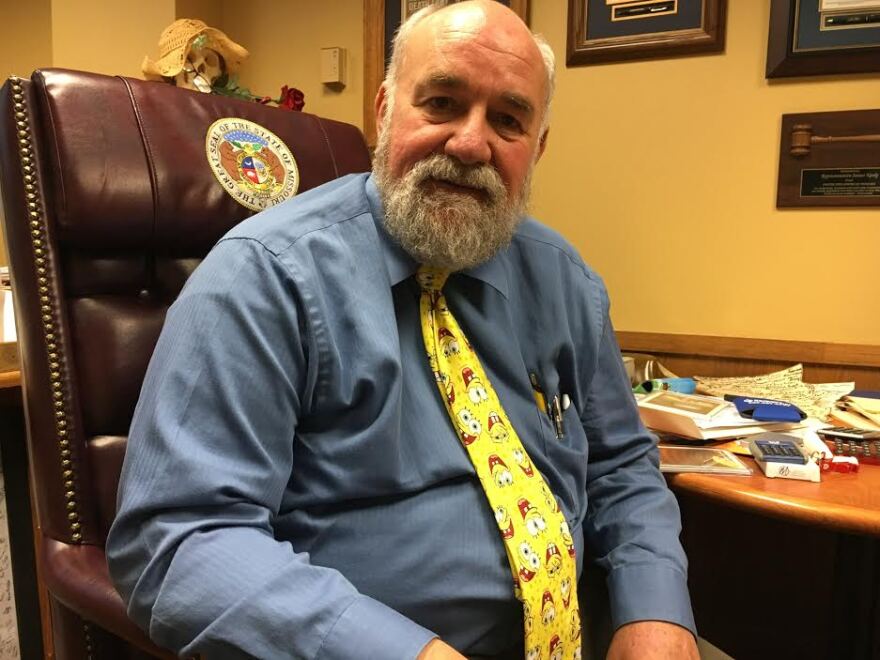State Rep. Jim Neely, one of a handful of doctors in the Missouri General Assembly, believes medical marijuana would help people with terminal illnesses.
That includes his daughter, who died of cancer several years ago.
“Over the years, I’ve seen a lot of people suffer,” Neely said. “I ran an in-patient acute care geriatric site unit where some of the side effects of the established medications are very challenging.”
Medical marijuana, Neely said, might help those people.
With the possibility of a statewide vote looming, Neely is sponsoring legislation that would set up a medical marijuana program across the state. According to a summary of the bill, it would allow someone to receive medical marijuana if a doctor signs a statement that “the individual suffers from a terminal illness and may benefit from treatment with medical cannabis and that the individual has considered all other treatment options currently approved by the FDA and all relevant clinical trials conducted in Missouri.”

It would also give Missouri’s Department of Health and Senior Services authority to publish a list of illnesses that medical marijuana can be used to treat.
“As a physician, hope is very important to people who have chronic illnesses or terminal conditions,” Neely said. “And so, I’m hoping that this legislation that we’ve crafted will provide hope for folks. And that’s the purpose. Nothing else.”
House Speaker Todd Richardson observed that medical marijuana has gained favor with his fellow Republicans since he joined the Missouri House in 2011. He noted that legalizing medical marijuana is a priority for the Silver Hair Legislature, an advocacy group for the state’s seniors.
Richardson, R-Poplar Bluff, said he wouldn’t be surprised if a ballot initiative for medical marijuana passes. But he added that he’d prefer the legislature to act on the issue.
“As you’ve seen in other states that have tackled the issue, the issues surrounding enforcement and surrounding who it’s legal for are complex and they change,” Richardson said during an episode of Politically Speaking. “And so, the ability for the legislature to come in to do the hard work in crafting a good piece of legislation and to have the ability to update that legislation as circumstances arise I think are really important here.”
Senate blockade?
Jack Cardetti is the spokesman for New Approach Missouri, one of the ballot initiatives being circulated to legalize medical marijuana. He said he agrees that it would be easier for the legislature to set up a program, but added he has doubts it will actually happen.

“Our goal here is really simple: We want to make Missouri the 29th state that allows patients and doctors to work together to access medical marijuana when appropriate for serious and debilitating illnesses,” Cardetti said. “Obviously, the easier and cheaper way to do that is through the legislature. Unfortunately, there just isn’t the support in the General Assembly to get that done — and in particular the Senate, where leadership is clearly opposed to this issue.”
Case in point: Senate Majority Leader Mike Kehoe said this month that he’s more comfortable seeing “what the will of Missourians” is through the ballot measure. Even though New Approach Missouri’s measure is a constitutional amendment that the legislature can’t change, Cardetti said there’s language in the measure allowing the state health department to make rules over the program. (State proceeds from the measure, which are estimated around $18 million, would go to the Missouri Veterans Commission and the program’s operating costs.)
“The value of 28 other states having a medical marijuana program is that when we were drafting this, we were able to look at what works and what didn’t work,” Cardetti said. “We’re really confident that the language we put together not only will it work in Missouri, but it’s worked in other places and brought places a lot of relief.”
(Click here to read New Approach Missouri’s ballot measure.)
For his part, Neely hasn’t read the ballot initiatives regarding medical marijuana. He also doesn’t know if his bill will end up passing this year, noting he isn’t part of House leadership.
But he added: “I wouldn’t have come up with this legislation if I didn’t think it was reasonable.”
“All I know is for me as a physician, I want to be comfortable with I’m doing,” he said. “And I think the approach that I’ve taken is a reasonable approach.”
On the Trail, an occasional column, takes an analytical look at politics and policy across Missouri.
Follow Jason on Twitter: @jrosenbaum







